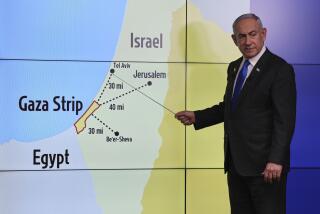Israel Gives Tentative OK to Ceding Land
JERUSALEM â In a sign of apparent progress in the deadlocked peace talks, Israel said Monday that it has agreed in principle to turn over an additional 13% of West Bank land to the Palestinians, the figure specified in a months-old U.S. peace initiative.
The government of Prime Minister Benjamin Netanyahu, which had said it could not accept the 13% figure without endangering Israeli security, has told U.S. mediators that Israel is now prepared to withdraw from that amount of land if other conditions are met, an Israeli spokesman said.
âWhatâs left is for the Palestinians to finalize their security obligations,â said David Bar-Illan, a senior aide to Netanyahu.
Israel continues to insist that 3% of the territory to be turned over be designated a ânature reserve,â with limits on Palestinian construction for an interim period, but has dropped a demand that the land remain permanently under Israeli security control.
âThereâs an agreement that the 3% would . . . become part of an eventual Palestinian state,â a source close to the negotiations said Monday. âItâs an opening for progress.â
All the land to be relinquished by Israel in the next phase of withdrawal would, under terms of existing agreements, be designated either Category A, under full Palestinian authority, or Category B, under Israeli security control and Palestinian civil authority. The expectation on both sides is that all the land could be included in a future Palestinian state, although Israel has not yet agreed to the creation of such an entity.
The U.S. initiative, which President Clinton presented to the parties in January, has not been officially announced, but details of it are widely known. The proposal calls on Israel to withdraw in three stages over a 12-week period from 13% more of the West Bank. In exchange, the Palestinians would give Israel a detailed plan for combating terrorism and take other security measures. The Palestinians have publicly accepted the proposal but Israel has not.
The Palestinians now have full or partial control over 27% of the West Bank.
At the same time, Netanyahuâs office Monday denied reports that he had dropped a demand that the Palestine National Council convene to cancel clauses in the Palestinian charter, or covenant, that call for the destruction of Israel. The Palestinians say they have already canceled the relevant clauses, but Netanyahu has made the issue a key tenet of his administrationâs peace policy.
Even so, there were signs of flexibility on the contentious issue. âThe charter is not an issue that has to be completed before thereâs an agreement, but before the withdrawal itself can be implemented,â Bar-Illan said.
Meanwhile, in Oslo, the Norwegian capital, Palestinian Authority President Yasser Arafat said the latest proposal could be âa beginningâ toward reviving the peace negotiations. But the mistrust built up during 17 months of deadlock also was on display as Arafat accused Netanyahu of policies that have damaged the 5-year-old peace process and engendered âdespair, hate and violence.â
Arafat was in Oslo to commemorate the anniversary of secret Norwegian-mediated talks that led to the historic 1993 peace agreement signed on the White House lawn. Netanyahu, who inherited the Oslo accords from his Labor Party predecessors, did not attend the ceremony but sent a representative.
Arafat was scheduled to meet Monday evening with U.S. mediator Dennis B. Ross, who also attended the commemoration in Oslo. Israeli and American officials said Ross could decide to fly to the Middle East from Norway if there appeared to be a chance that another round of mediated talks could produce a breakthrough.
All sides cautioned, however, that many obstacles remain in the path to an accord. There is still no agreement, for example, on other aspects of the U.S. initiative, including Israelâs insistence that the Palestinians provide a concrete plan for cracking down on extremist groups that operate inside Palestinian-controlled territory and the Palestinian demand for a halt in the expansion of Jewish settlements on occupied lands.
The need for a security plan has been cast into sharp relief here with the killing last week, apparently by a Palestinian assailant, of a Jewish settler in the West Bank city of Hebron, and with new threats from militant Islamic groups to attack U.S. and Israeli targets in the wake of the U.S. missile strikes against targets in Afghanistan and Sudan.
In response to threats from a leading Muslim figure close to Osama bin Laden, the dissident Saudi blamed by the U.S. for masterminding the recent embassy attacks in East Africa, Israel tightened security at its airports Monday, stopping cars approaching the facilities and questioning the drivers.
More to Read
Sign up for Essential California
The most important California stories and recommendations in your inbox every morning.
You may occasionally receive promotional content from the Los Angeles Times.










